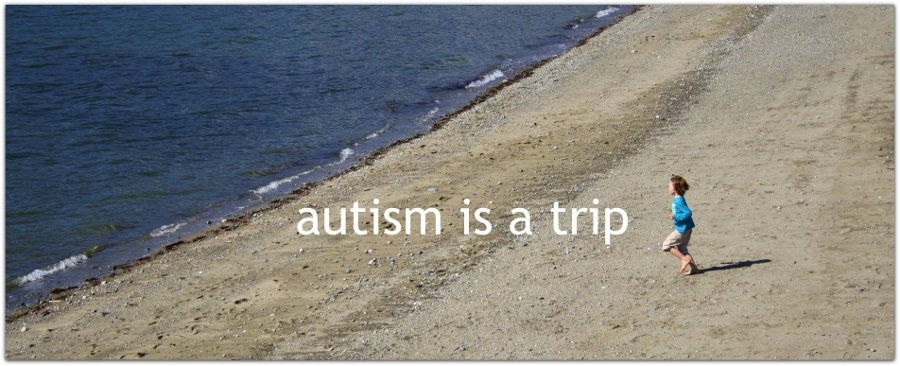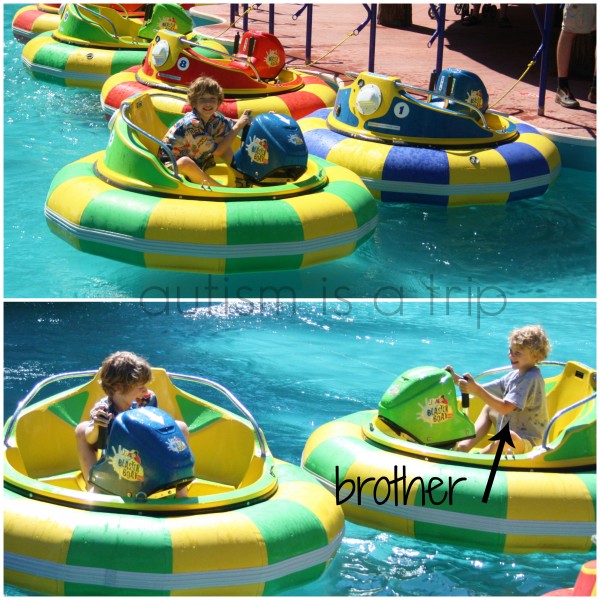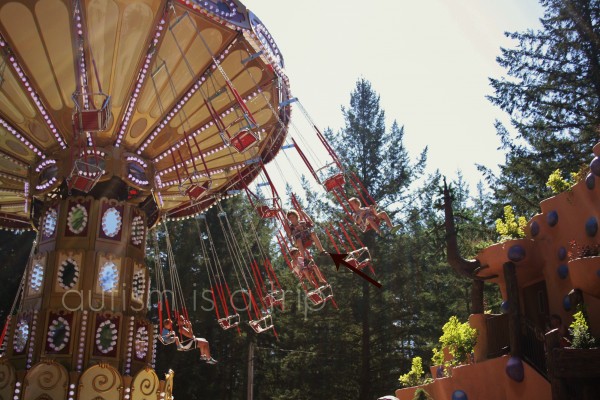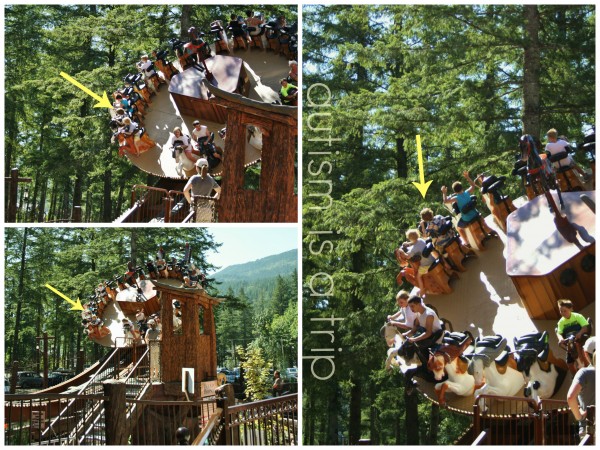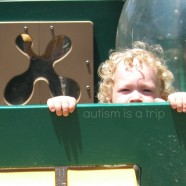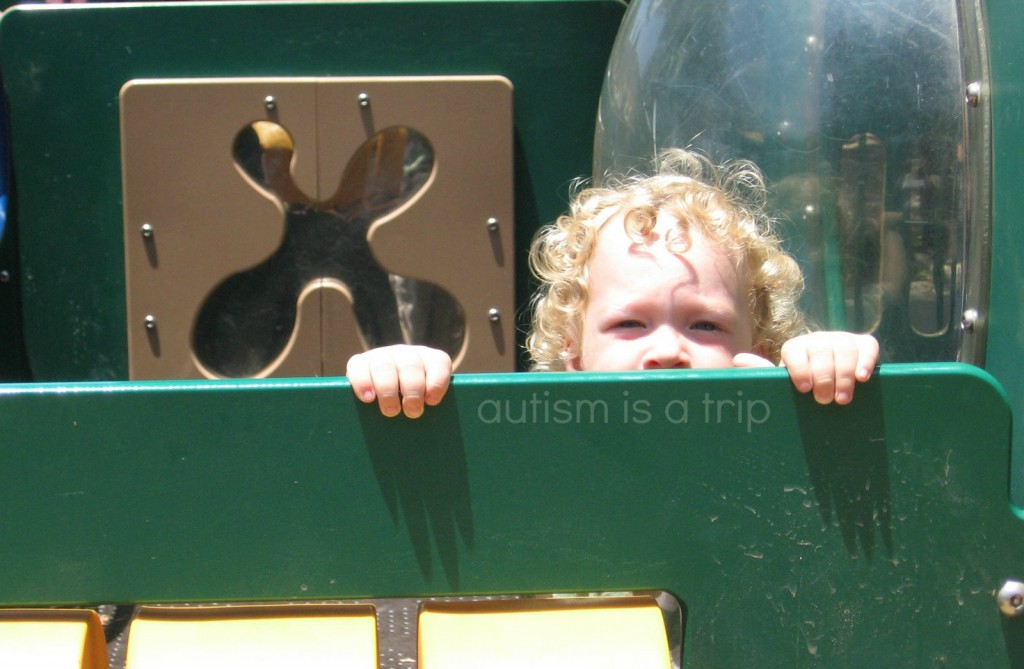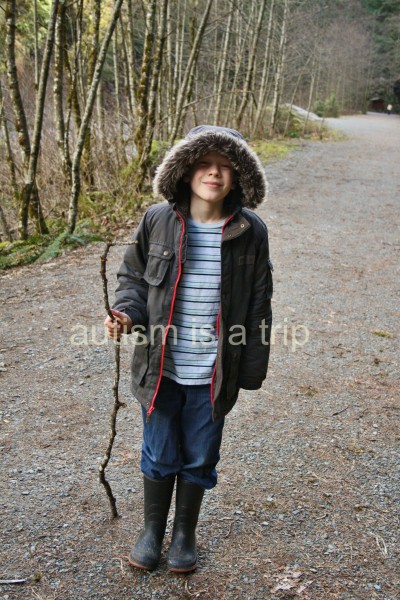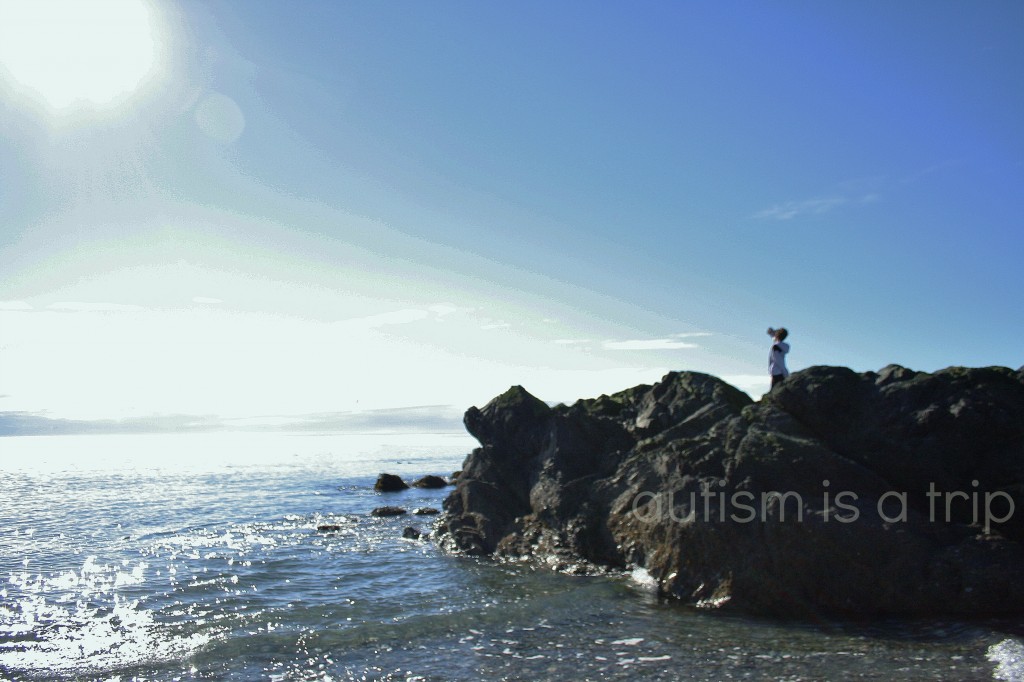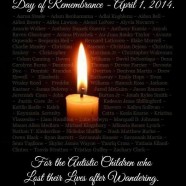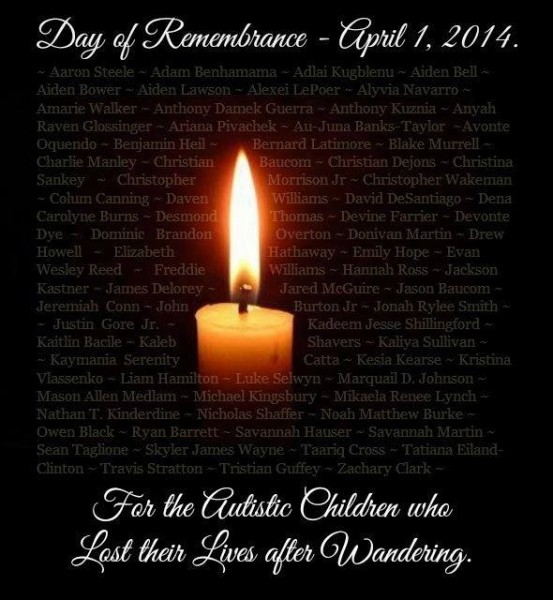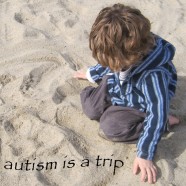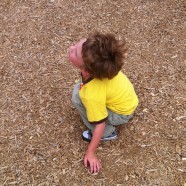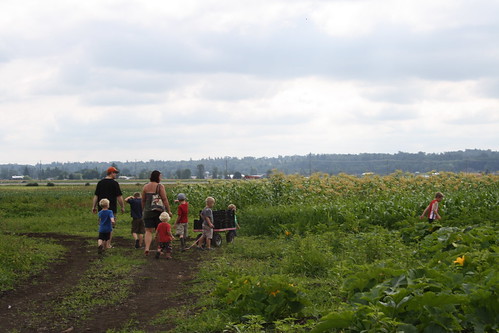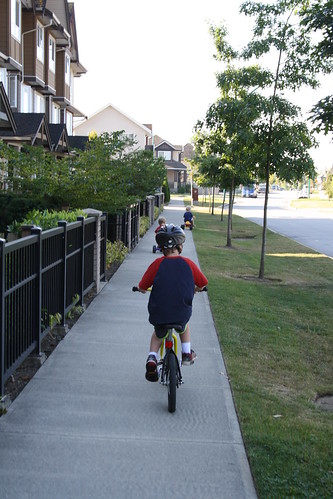Facing Our Fears
I’ve been away for a bit. I’ve been in a self-made cocoon of sorts, waiting for the right time to reveal my “new” self.
Or the self I’ve always been, but didn’t really know it.
Anyway, I’ve been thinking on the best way to start the conversation here. This place that I’ve built to laugh and cry, and bemoan, and celebrate autism in our family. This place that has become a safe haven for me and others, a place where it’s OK to be our true selves, autism, warts, and all.
I thought for a while that I needed to bring platitudes and great revelations. That I needed to be profound.
And as I sat, cozy and safe in my self-imposed little box, it came to me.
Rather, Jack came to me.
Jack has been my teacher on so many levels, and I should have known this would be no different.
A couple of weeks ago, we went to a small amusement park and a big water slide park on the same day. We don’t do amusement parks, as a rule, for a few different reasons: Money, crowds, autism, crowds, crazy children, lines, money, and, of course, crowds. The kids have been on a few rides here and there (most recently the Great Wheel in Seattle), but we haven’t done a full-fledged amusement park since Disneyland years ago when the kids were small.
The only water slides my kids have encountered have been the small ones at a downtown spray park, and the slide at our local pool (not small by any means, but not theme-park-sized).
I was worried how Jack would do on the rides, since he really seemed to hate them when he was younger. I also didn’t know how he would react to the water-slides, as you can’t exactly avoid being splashed in the face or dunked underwater.
To our relief, the amusement park was both quite small and fairly empty. The kids didn’t have to wait in line for anything. It was like an Autism Miracle.
He handled it all. Really well. By himself.
For instance, he did this:
He both shot his brother in the face, and took many hits in return. All with a big grin.
This one amazed me. Jack HATED swings as a baby and small child. It took about two full years of occupational therapy to get him to not only ride a swing, but enjoy it. Now he’s a swinging fool.
He did this:
This ride made my husband ill just looking at it. They’re up there spinning around, while spinning around. Like teacups up in the air.
And then he did this:
If you can’t tell from the photos, this little ride here is like a carousel on acid. You sit on a horse, and the platform starts to rotate. Then, the whole thing rises up one side of an arc, then down and up the other side. All while the platform is still rotating. Like someone thought the pirate ship that goes back and forth is a little too tame, and the carousel is just not dangerous enough.
So yeah, he rode that thing. Smiling.
We headed to the water slides, and Jack took off alone. I was worried about him, but figured he’d end up entertaining himself in the splash areas or pools.
Toward the end of our visit, my child ran up to me, dripping wet.
He had done this:
FIVE TIMES.
He was so excited to tell me. “Mom! I really conquered my fears today!”
And then he ran off to do it again.
I realize now that I haven’t been hiding in contemplation so much as in fear. I’ve been afraid. This post changes everything for me, but it’s time. If my child, who has come so very far in his almost-nine years of life, can stand up to his own fears and break through to the brighter side, so can I. And I will, for him.
This is my vertical drop.
So, here goes.
My name is Wendy, and I have Asperger’s.
I am autistic.
And I am happy.
Share this: Twitter | StumbleUpon | Facebook | digg | reddit | eMail Read More
Autism in British Columbia: Crisis in Process
My son Jack was born in the United States and raised in Los Angeles until the age of four and a half. Just before he turned two, he entered the California Early Start program for children with a risk of developmental delay or disability. We called for an appointment in August of 2o06, and by the end of September of the same year, he was enrolled in a variety of interventions and therapies.
At age three, he was formally assessed and diagnosed with autism by both the Lanterman Regional Center and the Los Angeles Unified School District (LAUSD). He was transferred to autism-specific supports, where he remained until we moved.
From the time Jack was twenty-two months until he was four and a half, Jack received the following interventions and therapies:
AGE TWO
- Collaborative preschool with typical peers in a clinic-based classroom, three-to-four days a week
- Two hours a week of clinic-based Occupational Therapy
- Two hours a week of home-based Speech Therapy
- Several sessions of Feeding Therapy
- He was also offered full-time preschool, additional Occupational Therapy, Floortime Therapy, and Respite Care, which we did not feel were necessary at the time.
AGE THREE to FOUR
Provided by LAUSD:
- Individualized Education Program (IEP) support
- Collaborative preschool with typical peers in a public school classroom, five days a week
- Full-time Behavioural Intervention Implementation (BII) aide at school
- Two half-hours a week of school-based Speech Therapy
- Two half-hours a week of school-based Occupational Therapy
Provided by Lanterman Regional Centre:
- One hour a week of clinic-based Occupational Therapy
- Twelve hours a week of home-based Applied Behaviour Analysis (ABA)
- Respite Care
- Parent training workshops
We also supplemented his therapies at home, with strategies learned from his providers.
Several of the supports at school and at home were coordinated through the same non-profit organization, so there was continuity in both areas. We felt very confident that our son was receiving every support he needed, and that should he need more, the options were available to us.
We were given choices of providers and schedules, and the ability to change supports and therapies as we saw fit, but we were guided through the process by a social worker at Lanterman (Early Start), and then a caseworker at Lanterman, a support worker at LAUSD, and a coordinator at the non-profit who provided our BII and ABA aides.
It is important to note a couple of things. First, we never saw a bill. Not once. My husband and I signed authorization forms, reports, and time cards, but we were never financially responsible for anything.
Secondly, we were given suggestions and options as to what Jack needed, according to several observations and reports. We were able to give our input, but we were not responsible for creating his treatment plans. We never felt like the burden of figuring out what he required was on us.
Finally, we never saw a pediatrician or medical doctor (other than the diagnosing psychiatrists) for Jack’s autism. In fact, it came as a bit of a surprise to his pediatricians when we told them about his diagnosis. Jack has never had any of the health issues commonly associated with autism, and as it is not required in California, we had no reason to include his doctors in the diagnosing process.
When our family moved to Canada, Jack was in the process of transitioning from preschool to Kindergarten. In Los Angeles, he would have had full-time BII support, and continued with both speech therapy and home-based ABA (he had graduated from clinic-based occupational therapy) for as long as necessary.
I cannot speak to how his support would have waxed or waned over the school years, but I have only good things to say about our experiences up to that point.
I can, however, tell you what happens here in British Columbia.
Once we were settled, we were required to get Jack a new autism diagnosis from a Canadian doctor in order to qualify for provincial autism funding. Government funding is Canada’s answer to autism support, similar to the Regional Center system in California.
First, we had to see a pediatrician, and convince him Jack needed a referral for diagnosis. I was honestly shocked when he balked at giving it to us, even though Jack had already been formally diagnosed in the United States. Twice. The doctor wanted to rule out ADHD (which, it turns out, Jack does have), and Fragile X Syndrome (which he does not), before he would even consider referral. I pushed, though, and he relented.
Next came The Wait. We were told the wait time for assessment would be almost two years, and indeed it was fourteen months before he was seen.
Fourteen months is forever in the life of an autistic child and their family.
It can also be the difference between full- and no-support.
Children assessed with a spectrum disorder in BC under the age of six receive $22,000 a year of funding to pay for their various supports. The family is responsible for deciding which therapies and interventions are necessary, and all of the hows and whens and whos of making them happen. I know how overwhelmed we were in Los Angeles, and we had several agencies overseeing and coordinating everything for us.
Many families in BC are lost and confused as to what is necessary and when, and who to trust to give them good advice. They are expected to become autism experts overnight, and to know what their child needs at any given time.
Once a child on the spectrum reaches age six, the yearly funding drops to a mere $6,000. To cover every single thing the child or young adult needs.
$6,000 doesn’t go very far, in case you’re wondering.
Now consider the child who has been waitlisted until they are six or seven, eight, or older. Those children don’t get retroactive funding; they’re given the same $6,000 every other child over six gets.
$6,000 to sink or swim.
My husband and I often wonder where Jack would be in his development if he hadn’t had such intensive interventions and instead had to wait years to be seen. The difference between the two months it took in Los Angeles and the fourteen months it took in British Columbia is monumental.
It’s a lifetime.
In the first fourteen months of Jack’s therapies, he learned to use his upper body. He learned how to play.
He learned how to talk.
I cannot stress enough how important the first year of Jack’s interventions was in shaping the person he is today. That time was invaluable to him, and to us.
I have met many families of autistic individuals here in BC and have heard a lot of stories. Some wonderful, many concerning. Some downright terrible.
In the Lower Mainland, where we live, there is only one team that assesses and diagnoses autism. One team for a large and rapidly growing population – the fastest growing region in Canada.
Wait times to be seen are so outrageous, families who are financially able resort to paying for their own assessments out of pocket. Even those clinics now have tremendous wait times.
Yes, there are legitimate circumstances where a child may be older before he or she is diagnosed, but for families seeking help for younger children, the situation here can be bleak.
I cannot imagine where Jack would be today without the solid start he got at a very young age.
I cannot imagine the kind of support he would have gotten if we had to decide his plan of action alone, without professional guidance.
I cannot imagine the outcome if we had had serious budget restraints, or had to turn down therapies because we simply could not afford them.
Autistic children in Alberta get up to $60,000 a year for supports through age 18. Why should children in British Columbia not get the same?
Why do children over the age of six get so much less than younger children? Is autism less severe over the age of six?
Why are families left to fend for themselves in a province so well known for caring for its citizens?
It breaks my heart to see even one child go without the therapy and intervention he or she desperately needs. I don’t understand how a province can willingly stifle the potential of certain individuals because of their age or where they live.
It’s just not right.
It’s not Canadian.
It needs to change.
Share this: Twitter | StumbleUpon | Facebook | digg | reddit | eMail Read MoreA Tragedy in BC – Failing The Caregivers
Autism Awareness (ought to be Acceptance) Month is winding down, and unlike April, it will not go out like a lamb. The lion of autism injustice is still roaring, louder than ever.
While people are walking and gathering and fundraising and celebrating the wonders and gifts of autism (which I wholeheartedly support), the dark underbelly is growing. It’s time for us to face it.
Death has become altogether too common in the autism community. Every week or so there’s another story about an individual who has bolted or wandered and not made it home. And every month or so, an autistic individual is harmed or murdered by a caregiver.
The tragedies are too numerous to count, and happening much too often. They are also hitting closer to home – both in proximity and emotion.
Our children are in danger.
Issy Stapleton. Alex Spourdalakis. And now, Robert Robinson.
Last week, British Columbia resident Angie Robinson murdered her 16-year-old autistic son, then took her own life.
It’s easy to automatically blame Angie. How could a mother possibly take the life of her own child? What kind of parent does that?
A desperate parent. A parent who has reached the end of their resources, both physically and mentally. A parent who believes they have absolutely no other answer.
Nobody thinks they could ever get to the point where suicide and murder are a viable option. We all assume if things get dark enough, someone will appear with a light.
No parent, even a parent of a profoundly disabled or autistic child, wants death (I’m assuming the best, of course). Even at the very end of the rope, we are still hanging on, holding out for a glimpse of hope.
But occasionally, the darkness consumes everything, and no light can get through. There is no hope. Or, at least, that’s what a desperate parent believes.
Yes, the violent acts visited on children by their own parents and caregivers is atrocious and unimaginable. No child should ever fear for his or her life in their own home. I am not suggesting that what Kelly or Angie or Alex’s grandmother did are acceptable in any way.
But I do understand them. And I can understand how things could get so desperate for them that they felt they only had one solution.
It all comes down to support. The proverbial village. The village that supports the child needs to support the caregivers and parents, too, and therein lies the rub.
Autism supports vary from country to country, province to provice. There is no standard of practice or care even within a the US or Canada. Children and individuals with autism often need intense, one on one care, either in the home or a residential facility. Not every family is equipped to handle these situations, yet there is often little in the way of respite and support for them.
As far as I can tell, support for caregivers is pretty much nonexistent. If a family member requires placement or full-time care and none is available, what is the caregiver to do? Between a lack of professional support and the overwhelming costs of respite and residential care, it should really be no surprise that parents are losing hope.
There are two victims in these crimes. Two lives lost. Two stories that didn’t have to end this way.
When a desperate parent decides to kill their child and themselves as a way out, the entire autism community has failed.
We have failed the child by not giving them everything they need to live a happy life to best of their ability.
We have also failed the caregiver by not recognizing that a healthy caregiver is essential to a healthy, happy autistic individual.
We cannot expect autistics and their families to survive and thrive if they are constantly at war just to get support.
Any one of us could reach the limit. Or anyone we’ve met. Nobody knows just how much someone can take, and what will be their breaking point. We need wholesale change in the way we support autistic individuals and their caregivers. The reality is if the caregiver is too stressed and is getting no help or relief, the whole family is in potential danger. These horrible stories will continue until something big changes.
Caregivers need to be heard and helped when they reach out. By the time a parent reaches the point of murder and suicide, it’s too late. Families need care and support from the very beginning, not just when things get rough.
Until then, keep your ears and shoulders available for your friends, in real life and on the internet (which is oftentimes who need it the most). Be a friend, be aware of what’s happening. Also, don’t hide your situation from the world. Open up to anyone you think will take you seriously.
And let your local government know how you feel about caregiver support and the lack thereof. Be loud, and be heard.
If the system can’t/won’t help us, we have to help ourselves.
Share this: Twitter | StumbleUpon | Facebook | digg | reddit | eMail Read MoreAutistic Wandering is No Joke
Every year, almost half of all children with autism attempt to escape, or elope, from a safe environment. Too many of them never make it home.
Today, April 1, 2014, we pause to remember those we have lost to wandering.
From the Facebook event description:
“This event is a virtual candlelight vigil to remember and respect the lives of autistic children who have died after an elopement.
The Kennedy Krieger Institute reported in a 2011 study that up to 48% of all children with autism will engage in wandering behavior or “elopement,” which is defined as the tendency to leave a non life threatening space and enter into a potentially dangerous one, and is a rate 4 times higher than their neurotypical siblings.
The Krieger Institute also reported that “35% of families with children who elope report their children are “never” or “rarely” able to communicate their name, address, or phone number by any means.”
In 2012, the National Autism Association reported that “accidental drowning accounted for 91% total U.S. deaths reported in children with an ASD ages 14 and younger subsequent to wandering/elopement.”
This vigil is being organized to spread awareness of the very real issue of wandering behavior in autistic children and the unspeakable tragedies that can, and have occurred as a result.
Please join us in respectful remembrance of the children who have died.
For additional resources check the website: http://www.awaare.org/
Or find them on facebook: NAA Autism & Safety: Wandering Prevention”
This is by no means a comprehensive list of every child and individual lost to wandering, but it is entirely too long already. Please, do your part to help make sure we don’t have to add more names next year.
Kaitlin Bacile
Au-Juna Banks-Taylor, age 9
Ryan Barrett
Christian Baucom, age 6
Jason Baucom
Adam Benhamama
Owen Black, age 7
Aiden Bower, age 4
Ashley Brock
Noah Burke
Carolyne Burns
Dena Burns, age 6
John Burton Jr., age 7
Colum Canning
Kaymania Catt, age 5
Alex Christopher, 6/3/05
Zachary Clark
Jeremiah Conn, age 6
Holden Cottingham, 2013
Taariq Cross, age 7
Christian Dejons
James Delorey
David DeSantiago, age 11
Devonte Dye, age 5
Tatiana Eiland-Clinton, age 3
Devine Farrier
Justin Gore, Jr.
Darryl Gosein
Anthony Guerra, age 9
Tristian Guffey
Liam Hamilton, age 7
Elizabeth Hathaway, age 10
Savannah Hauser
Benjy Heil
Jack Hensley
Emily Hope
Drew Howell, age 2
Tristin Jeras, 7/26/12
Aiden Johnson
Marquail Johnson, age 8
Jackson Kastner, age 4
Kesia Kearse
Nathan Kinderdine
Michael Kingsbury, age 7
Adlai Kugblenu
Anthony Kuznia, age 11
Bernard Latimore
Aiden Lawson, age 3
Kieran le Couteur
Erik Lippmann
Alexie Loper, age 4
Mikaela Lynch, 5/15/13
Charlie Manley, age 16
Savannah Martin, 2/20/11
Donivan Martin, age 16
Savannah Martin, age 7
Jason McGuire
Mason Medlam
Logan Mitcheltree
Christopher Morrison, age 5
Blake Murrell, age 4
Alyvia Navarro, age 3
Avonte Oquendo, age 14
Dominic Overton
Ariana Pivacheck, age 9
Evan Reed, 2012
Hannah Ross, age 7
Blake Ryan, 4/19/11, age 4
Christina Sankey, age 29
Luke Selwyn
Nicholas Shaffer, age 12
Kaleb Shavers, age 6
Kadeem Shillingford, age 15
Jonah Smith
Julian Stacey, New Zealand
Travis Stratton, 3/1/14, age 4
Kaliya Sullivan
Sean Taglione, 1/29/12, age 12
Desmond Thomas
Kristina Vlassenko, age 10
Christopher Wakeman, age 23
Amarie Walker, age 4
Skylar Wayne
Freddie Williams, age 13
Davin Williams, age 15
NNR, age 5, Bradenton, FL
NNR, age 11, Stafford, VA
NNR, age 12, Houston, TX
On the Defense
I’ve been on a kind of hiatus for a while now, while I was pregnant and had my fourth child. A fourth boy. I’ve been ready to come back for a few weeks, but got caught up in the holidays and boy #3’s birthday and more holidays and life. I have stories for you, tales of Jack and his new brother, Jack and his fascination with horrible weather events and historical vehicular disasters (both air- and sea-borne), Jack and his new love of making gifts for everyone. Stories about how we need to find an ABA or someone who can help me now that Jack’s older, anecdotes about how Jack is doing in school.
Life has, as is its wont, interceded in my plans.
On Friday, twenty children died. Twenty mamas lost their babies. Twenty families were wrenched apart at the very time of year we, regardless of religion, tend to gather our loved ones closest. Those charged with keeping them safe died as well, in the course of doing that very job. There are older mamas missing babies tonight, too.
Why should this affect me, other than the fact that two of my children are the same age as those who were lost? Other than the obvious devastation one feels when something horrifying transpires? Other than the unbearable sadness at the loss of innocents? One word.
Autism.
There have been rumours and speculation that the individual who destroyed twenty-seven lives is on the spectrum. Nothing concrete, but enough for the mainstream and social media to grasp in their hot little feeds and run with. I have seen comments on my friends’ posts about how “the shooter has autism and that’s why”. I watched Piers Morgan, on CNN, say that people with Asperger’s are “missing a piece of their brain” and can’t feel sympathy. I have felt the bile rising in my throat for three days.
Everything I’ve worked for with my son is teetering on a fence now. This situation could go either way. People will come to their senses and understand that ASD is not the cause of a massacre, or they won’t, and I fear for what happens then. I’m girding myself, because people have notoriously and stubbornly, as evidenced by our last election, refused to be sensible.
Why should this bother me? My child doesn’t have rage issues. My child would never do this. My child isn’t in danger.
I’m sure there are many parents out there tonight who thought the same things and were wrong.
I don’t know what the future holds for my child, or how his ASD is going to affect him in five or ten or twenty years. I can only hope that with early intervention and constant, loving support, he’ll be a contributing member of society. A happy person with nothing more on his plate than he can handle, and the sense to reach out for help when he can’t.
What I do know is that all of a sudden, instead of telling people that my son has autism with a sense of pride (because I am damned proud of my son), I am defensive. I feel the need to explain. He’s high functioning. He’s really empathetic and loving. He’s not that person.
I don’t want to be defensive about my son, and I don’t want him to ever feel defensive about himself. Especially not because some other person who may or may not be on the spectrum had more than he could handle and made some seriously bad decisions. I want him to be as proud of himself as I am, always.
Someday I will tell him about the babies who were lost, and why. And we will talk about it, and we will probably not be able to understand, ever. And I will continue to tell him that he is loved and supported, even if he’s angry. Even if he’s angry with me.
Mental health support is vital. The village cannot survive without it. I’m doing my part.
Namaste.
Share this: Twitter | StumbleUpon | Facebook | digg | reddit | eMail Read MoreClose Enough to Care
They say small children unleash their anxieties and frustrations on those closest to them. A two-year-old could be a dream child all morning at daycare, then come home and spend the next hour screaming bloody murder at mama. A four-year-old can play all afternoon in preschool, never losing his smile, then tantrum to shake the walls for daddy on the way home. An autistic almost-six-year-old can work all day in school, barely taking a break to play (his choice), and tear down the very foundations upon his arrival at three o’clock.
I am used to this. All of my children have done it, and I remind myself it is because they feel safe and secure with me, enough to put down the “happy kid” facade. Jack, especially, has it down to a science. Even as a baby, when we would keep him out until all hours (because he didn’t sleep until three or four am), he would smile and laugh and have a wonderful time wherever we were. That is, until we crossed the threshold into our home. The door would close, and Happy Jack disappeared, replaced by Screamy Jack. Screamy Jack raged for hours, pretty much in symmetric relation to how long we’d been out. If we went on vacation, he hung around for a week after we returned.
Screamy Jack only likes to be around immediate family, though. Screamy Jack needs the love and support and freedom to vent his frustrations, and only Mama or Daddy will do for that. Actually, it’s usually only Mama who gets the pleasure of his company. Jack has never “acted out” with anyone but myself, my husband, or one of his therapists/aides. Until today.
We have never had “family friends” who lived nearby. My husband and I have friends, some of them have children, and none of them have ever been within walking distance, mainly because we previously lived in a very non-kid-friendly area of a not-too-kid-friendly city. We now live in a neighborhood and region teeming with children, and we were bound to meet some of them, and their parents, eventually. We met Team Hartman (we’re Team Baskin) at the playground near our house. They have three boys very close in age to ours, and we clicked with the mama and daddy. A family match made in heaven.
We have had playdates with Team Hartman, birthday parties, BBQ’s, and all of the things you’d expect from neighbors who are also friends. Our kids are even in school together now that Jack has officially transferred. I know it’s what folks do every day, everywhere, but it’s new to us, and we’re enjoying it.
My husband has a new job with daytime hours, so Mama Hartman has, on occasion, brought Jack home from school with her son. For some reason Jack calls her his “daycare lady,” even though her care really only entails meeting him outside of class, a few minutes of playtime at the school playground, spirited conversation between Jack and her seven-year-old on the way home, and depositing him on our doorstep.
Today, Mama Hartman decided to stop off at our neighborhood playground for a bit on the way home. Jack is always exhausted after school and I rarely take him to play in the afternoons because of that, but I figured since he was already out and about it couldn’t hurt. A lot of lessons were learned today.
Jack loves Mama H, and I know the feeling is mutual. That is the only explanation I have for why, after some good playtime, Jack lost it. He fell apart. He crumbled completely and laid himself bare. She was at the playground by herself with her own three children, the youngest, at two, has his own evil alter ego shown mainly to her. And she had Jack, or should I say, Screamy Jack. He did not want to leave the playground. He did not want to stop throwing things. He did not want her to take an alternate route home (the park is 3 blocks from us). He threatened, he bargained, he screamed, he raged, he cried.
He trusted her enough to let himself go.
Several things went through my mind when she showed up on my doorstep with him, frazzled a bit but still smiling. First, it dawned on me that there have been only a handful of occasions in Jack’s six years that we have let him out of our sight with someone other than a teacher or therapist. Secondly, I wondered if this woman, who I consider a friend, would ever dare take him anywhere but straight home ever again. And third, I realized that there must be a pretty strong level of trust and love there for him to let his guard down and be vulnerable like that with her.
Mama H has spent enough time around Jack to know when he’s in distress, even if she’s not had to deal with it directly. Thankfully, they were close enough to home that I could have come for him if necessary. I didn’t need to. She got him into the car, endured his abuse on the way home, and delivered him safely. I know our friendship may have been tested this afternoon, but I also know I now trust her more than ever.
Once home, Jack apologized for his behaviour and gave her a hug. When pressed as to why he melted down, he said he was “afraid there would be trouble, but there wasn’t.” For some reason he felt fear – maybe he thought she’d tell me he’d acted out and he would be in trouble, maybe he didn’t recognize our neighborhood from a different street and thought he’d be lost. Whatever it was vanished on our doorstep.
Mama H has expressed an interest in learning about autism, and I’m guessing she got a crash course today. I know that as Jack gets older more people will come into his life, and more people will gain his trust. I can only hope they all treat him with the same respect and love.
Share this: Twitter | StumbleUpon | Facebook | digg | reddit | eMail Read More